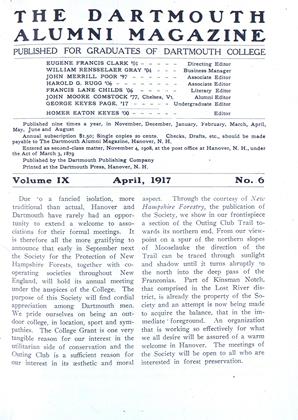ARE DARTMOUTH MEN REARING TOO SMALL FAMILIES?
Dr. Charles W. Eliot recently stated that "within two generations the American family has shrunk in number to an alarming extent." Where formerly our grandparents in New England had families of six to twelve children, our fathers had seldom more than four or five, while now it is common to find few children, and often none at all.
The Dartmouth class of 1897, which this year will be celebrating its twentieth year after graduation, may be perhaps a good type of class to analyze as to marriages and births; for after twenty years out, the men are well into their 40's, with life work and families well established.
The class of '97 graduated 89 men.
The birth, graduation age, and present age of this class is as follows: (See Figure 1.)
AGE AT AGE ATYEAR OF NUMBER GRAD- 20TH BIRTH SENIOR YR. UATION REUNION 1861 1 member 36 years 56 years 1865 1 member 32 years 52 years 1868 2 members 29 years 49 years 1870 1 member 27 years 47 years 1871 2 members 26 years 46 years 1872 8 members 25 years 45 years 1873 15 members 24 years 44 years 1874 29 members 23 years 43 years 1875 31 members 22 years 42 years 1876 13 members 21 years 41 years 1877 1 member 20 years 40 years Average age at graduation 23.1 years Average age 1917, 20 years out, 43.1 years
The present vocations of the men who graduated in this class are shown graphically in Fig. 2.
This makes a percentage of men: In Business .............. 36.2% In Professions............ 42.7% In Teaching............... 20.1%
The marriages of this class (See Fig. 3) and children born into these families (See Fig. 4), as far as available figures can be obtained, have been as follows:
Class of 1897 graduated............... 89 Married.............................. 74 Have Children ......................53 No Children......................21 Single.........................10 Not known..................... 5 Children Boys.......................... 64 Girls ....................... 49...113 Children now living................. 110 Families of those married: 21 have no children 19 have one child 19 have two children 9 have three children 5 have four children 1 has six children.
This makes an average number of children for the entire class of only 1.3 children per man. Now if these figures for a particular class are typical of others, are the men of Dartmouth failing to reproduce themselves?
Professor Charles B. Davenport, of the Carnegie Institution at Washington, charges that the birth rate of the better classes is constantly falling, that a Harvard class does not reproduce itself. This same situation is apparently true at Dartmouth.
With 23% out of 89 men of '97 married' but with no issue, and 10 men remaining single, we must conclude that the securing of an education is not conducive to progeny.
It took 7 years after graduation in 1897 for half the class to be married, and of the children born into those families, it took twelve years after graduation for half the present number of children to be born. Are we to conclude therefore, that it takes a Dartmouth man five years longer after graduation to begin rearing a family than those who finished their education at the close of high school?
It has taken this particular group of men ten years longer to establish a growing family than most men, and the cause both of late marriage and late rearing of children is probably due to the desire to establish himself financially on a sounder basis.
Luxury and the general prevailing expensiveness of living, the greater demands of family life, the greater ambitions of women today, compel educated men to delay marriage and the rearing of a family. It's a pity. Perhaps earlier entrance to college would offset this.
Late marriage means small families for college men. Is there not some remedy for this at Dartmouth? Is it the duty of the college to speed up the educational period and launch men into active life earlier?
 View Full Issue
View Full Issue
More From This Issue
-
 Article
ArticleANNUAL MEETING OF THE DARTMOUTH SECRETARIES ASSOCIATION
April 1917 By Eugene D. Towler '17, W. J. TUCKER. -
 Article
ArticleTHE UNDERGRADUATE MONTH
April 1917 -
 Article
ArticleDARTMOUTH'S MILITARY POLICY
April 1917 -
 Article
ArticleDue to a fancied isolation,
April 1917 -
 Article
ArticleMARCH MEETING OF THE TRUSTEES
April 1917 -
 Article
ArticleFRANCE HONORS MR. AND MRS. TUCK
April 1917











